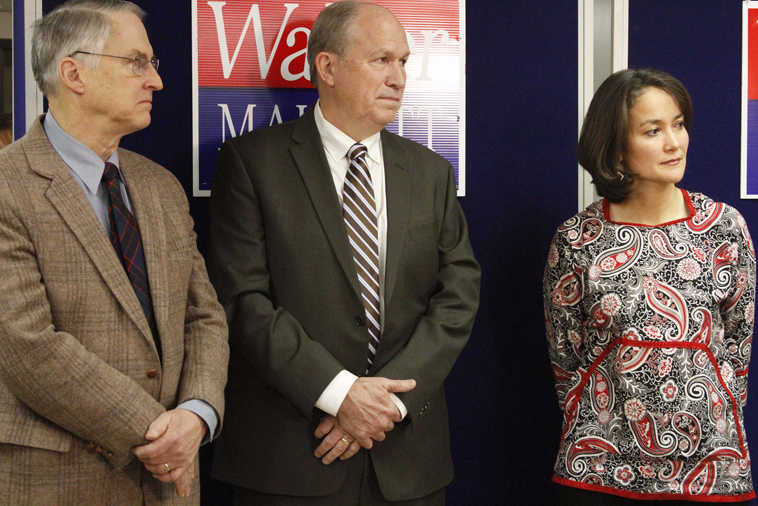ANCHORAGE — Bill Walker, the leading candidate for Alaska governor, introduced former state Sen. Rick Halford and Ana Hoffman of Bethel on Wednesday as co-chairs of his gubernatorial transition team.
Walker, an independent, hasn’t been declared the winner in the race, but he has a 4,000-vote lead over incumbent Republican Gov. Sean Parnell. At least 33,000 more votes will be tallied starting Friday.
Walker said his team is being assembled in recognition of a constitutional deadline that the governor be sworn in Dec. 1, not because of any knowledge about the outcome.
“It seems to appear to be prudent to do what we’re doing,” he said.
Parnell has not conceded to Walker. He told supporters in an email Wednesday that “this race is not over.”
“With more than 30,000 ballots yet to be counted, there’s still no clear winner in our race,” Parnell wrote.
With the possibility of a new administration, however, Walker said he had a discussion with Parnell recently, calling it a “good cordial conversation.”
At the press conference, Walker and his Democratic running mate Byron Mallott introduced Halford, a Republican, and Hoffman, a Democrat and co-chair of the Alaska Federation of Natives board of directors.
The team’s goal is to explore a range of broad topics facing a potential new administration and gather people from around the state to discuss pressing issues.
The co-chairs said policy topics anticipated to be covered in the process include climate change, economic development, fisheries, consumer energy and corrections, as well as natural resources and revitalizing the Alaska Army National Guard in rural communities.
Walker said possible replacements for administration officials will not be part of the process, adding it would be inappropriate to do that without a clear victory. As for the Dec. 15 due date for the governor’s budget, he said he would use Parnell’s budget as a starting point.
The candidates struggled to expound on what appears to be a vague transition process. Asked what the end result of the team will be, Mallott said that’s something the campaign had pondered, and added the goal is to hear Alaskans’ voices.
“A transition is vague,” Halford said. “It’s particularly vague when you don’t have final results.”
Walker’s lead has widened since his 3,000-vote edge over Parnell after the Nov. 4 general election.
Parnell initially was considered the favorite in the race over Walker, who finished second behind Parnell in the 2010 Republican gubernatorial primary. Walker bypassed this year’s primary after opting to gather signatures to qualify as an unaffiliated candidate.
The race tightened after Walker merged his campaign with that of Mallott, who won the Democratic gubernatorial primary in August.
To join campaigns with Mallott as the lieutenant governor candidate, Walker dropped his membership in the Alaska Republican Party. The so-called unity ticket was seen as providing a more formidable challenge to Parnell.
During the campaign, Parnell also was dogged by criticism that he did too little too late in handling allegations of sexual abuse within the Alaska National Guard that emerged in 2010, a characterization he disputed.
Walker was criticized by Parnell as having contradictory views and no specific plans. Parnell and his supporters also questioned the merged campaign, asking how a social conservative, such as Walker, could govern with a more liberal second-in-command.
Follow Rachel D’Oro at https://twitter.com/rdoro

